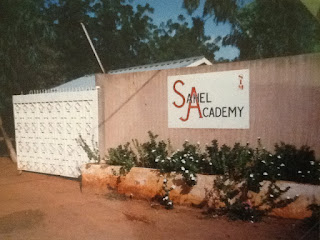August 13, 1996 was my first day of school as a teacher. I could not have asked for a better school to have my first teaching job.
Sahel Academy was relatively new, in fact, they didn't have a senior class yet. There were 6 freshmen, 4 sophomores, and 2 juniors. My teaching assignment included Algebra 1, Geometry, Algebra 2, Biology, and Chemistry. Fortunately, I only taught Chemistry for two weeks, until the other math and science teacher arrived. You see, in a mission school where teachers raise their own support to get there, not everyone makes it exactly when they'd like to.
I faithfully kept a journal the entire year there, so I've been reading through it, remembering some precious times. I spent my first day teaching at Sahel Academy saying, "um" a lot and sweating even more. As the days went on, I said, "um" less, but continued to sweat. My students forgave me for this though. Being in Niamey, Niger meant that even on the cool days, the highs were in the 90s.

One of the biggest adjustments for me was feedback. While in college, I received regular feedback (and encouragement) on my performance through graded assignments from professors. Teenagers don't hand out grades. I had to learn to get feedback other ways. Yes, the principal observed me once or twice, but I needed more feedback than that. I learned to value when a student was willing to open up to me, when hands were willingly raised to answer questions, and when we went over a homework question and upon hearing the answer, a student would say, "Yes!" under her breath. My report card now came in the form of notes from students in my yearbook. I still have that little yearbook 20 years later, and treasure the memories and encouragement stored in that book.


Something else that I learned in the beginning of my teaching career is that students work better for you when they know you care about them. Fortunately, I was single and wholly devoted to these kids. I saw them fairly regularly as well. We all frequented the American Rec Center to go swimming. I even went to a Super Bowl party with several students at the home of the family of two of my students. With the time zone difference, the game didn't actually start until midnight. We were all pretty tired at school the next day, but the fun we had rooting for the Packers was worth it--and did some more relationship building.

I'm not sure how I managed it, but I fairly regularly brought no school work home over the weekend. With just teaching two classes this past year, I worked on class plans nearly every evening and always on the weekends! I like to think that my lessons last year must have been far more involved and polished than in my first year of teaching. I do work much harder at planning my classes so that the students participate in activities and investigations to learn the material with a minimal amount of lecturing from me. My philosophy of education now is, "He who does the most work does the most learning." I don't mean giving lots of homework! I do my best to minimize passive listening. I did far more direct instruction my first year than I should have.

As a student, the last day of school was always a great celebration, but after that first year of teaching it was such a sad day for me. I'm sure if I weren't about to return stateside, it would've been a more festive day for me too. There were so many hard good-byes that day. I certainly loved those students and left a big part of my heart at Sahel when I flew home the next week.

















